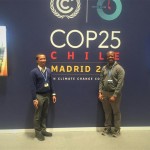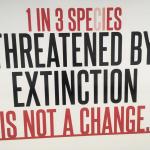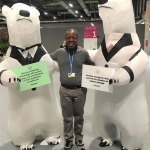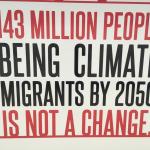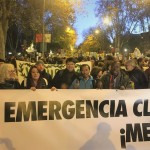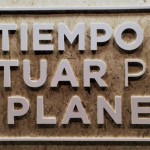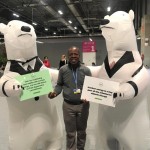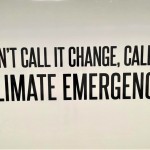On December 2-12, 2019, Friar Joseph BLAY attended the twenty-fifth edition of the Conference of the Parties (COP25) in Madrid, Spain. He was joined by Mr. Budi TJAHJONO, the program coordinator for the Asia-Pacific region of our Franciscan NGO, Franciscans International (F.I.). Both of them were representing F.I. at the Conference. Friar Joseph also represented the Roman VI [a union of Delegates General for Justice Peace and Integrity of Creation (GPIC) of the six branches of the Franciscan family in Rome], and the Order of Friars Minor Conventual. The conference took place at the Feria de Madrid Event Center. There were over 25,000 participants from 200 countries.
The Conference of the Parties (COP) derived from the United Nations Framework Convention on Climate Change (UNFCCC). In 1995, the signatories to the Convention, referred to as parties, held their first COP conference. The COP is a forum for member states to work out and agree on ways to mitigate global climate warming. Two of the more important documents in the history of the COP are the Kyoto Protocol, which was formulated in Japan in 1997 (COP3) and the Paris Agreement, which was formulated in France in 2015 (COP21).
This years’ COP25 is crucial because the Paris Agreement is supposed to take effect next year. In the forward to the 2019 Intergovernmental Panel on Climate Change (IPCC) Report, Petteri TAALAS, the Secretary-General of the World Meteorological Organization and Joyce MSUYA, the acting Executive Director of the United Nations Environment Program, wrote, “Without increased and urgent mitigation ambition in the coming years, leading to a sharp decline in greenhouse gas emissions by 2030, global warming will surpass 1.5°C in the following decades, leading to irreversible loss of the most fragile ecosystems, and crisis after crisis for the most vulnerable people and societies.”
Besides the representatives of the signatory states, others attending these Climate Summits include NGOs from business, social, cultural and faith backgrounds and youth groups. Faith-based NGOs, like F.I., attend the Conference with the aim of drawing people’s attention to essential values that have been obscured by certain politicians and by the multi-national business world. The NGOs also aim at offering proposals that are more just and integral. The key messages of many of the NGOs at COP25 were also in agreement with Pope Francis, who believes that the solution to global climate change requires something more than merely geo-engineering efforts and the carbon credit market. Many of the NGOs lobbied for ecological conversion, a change of lifestyle, the rights of indigenous peoples, and the “rights of nature.” Some of the world’s finest artists presented beautiful drawings at the Conference in order to highlight the dangers that global warming poses for the earth.
On Thursday, December 5, under the auspices of the Episcopal Conference of Spain, all of the Catholic Organizations participating in COP25 held a side event at Madrid’s Auditorio Fundación Pablo VI, [Paul VI Foundation Conference Center Auditorium] located on Paseo de Juan XXIII. The Secretary to the Episcopal Conference of Spain, the Most Reverend Luis Javier ARGÜELLO GARCÍA, Auxiliary Bishop of Valladolid, Spain, gave an opening address. In it, the bishop hinted about some special activities Pope Francis plans to organize, including the commemoration of the fifth anniversary of Laudato Si’, the Season of Creation and the Economy of St. Francis. On Friday, December 6, a mammoth crowd of about 500,000 people joined a two-hour climate march down some of the principal streets of Madrid. The march started from the Plaza de Atocha and continued to the Nuevos Ministerios government complex.
Fra Joseph BLAY Delegato GPIC







